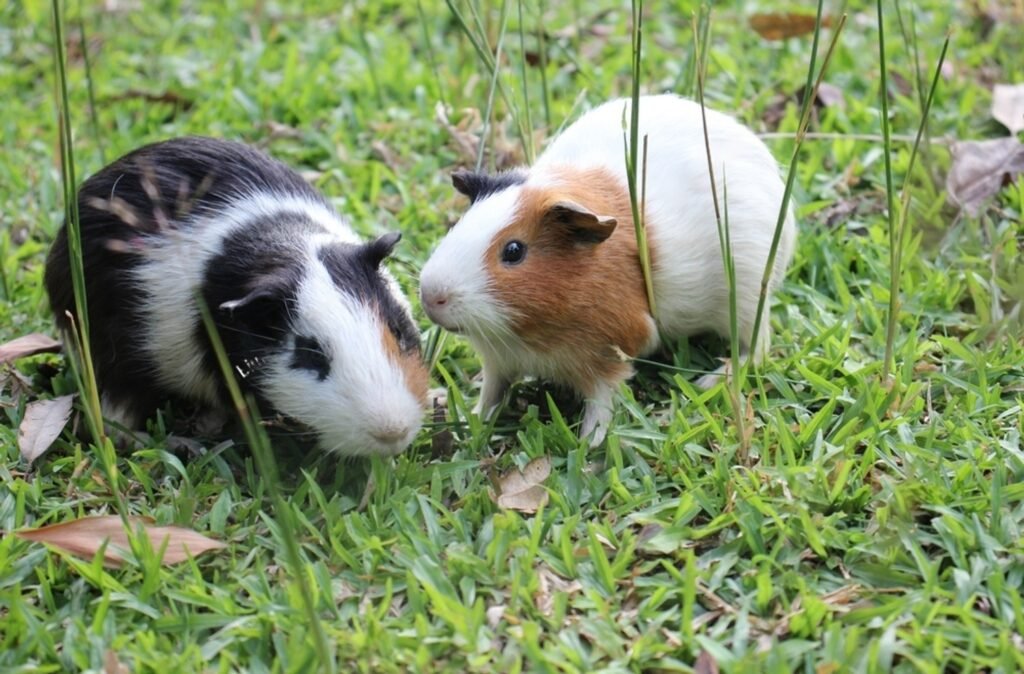Ready to get a guinea pig this year? If so, you’re in for a treat! These happy, fluffy, and adorable little creatures quickly become part of the family, and they’re sure to keep everyone entertained with their playful antics.
Even though guinea pigs make a fairly low-maintenance choice as an animal to keep, you’ll still need to take on a few essential responsibilities when it comes to their care and welfare. We’ve outlined seven of the most essential steps toward keeping your guinea pig healthy, happy, and ready for fun.

Guinea pig care: 7 of the most important habits
- Feed them a healthy diet
Nutrition is just as crucial for guinea pigs. Make sure you feed your hogs a balanced diet that includes the occasional treat too.
As well as nutritionally complete guinea food, you should provide some fresh snacks. Just remember that at least 85% of the guinea pig food you provide should be hay and grass.
It’s safe for guinea pigs to eat some types of fruits and vegetables as a treat. Favorites include carrots, cabbages, and other leafy greens. In fact, guinea pigs need fresh greens every day to give them Vitamin C, since they can’t produce enough on their own.
- Give them plenty of hiding spaces
Guinea pigs love to hide – they’re not very agile, and they certainly can’t climb. To make sure your piggies never feel vulnerable or scared, make sure you create cosy spots and hiding places so they can hide out of sight whenever they’d like to.
They enjoy making tunnels, so providing a deep or long enclosure could be an easy way to keep your guinea pigs entertained. Their environment should be safe, hazard-free, and low enough to ensure that they can’t fall from a height and injure themselves.
- Make sure they have some company
Guinea pigs are incredibly sociable animals. In the wild, they would likely live in groups of between five and ten. Keeping them in pairs or small groups is the best choice for their well-being, but it’s absolutely essential to get your male guinea pigs neutered if you’re keeping boys and girls in the same enclosure!
- Keep their cage cosy and clean
Guinea pigs can be active for up to 20 hours each day. For this reason, you need to make sure that their little home is a sanctuary in which they can feel safe and comfortable. A large part of this responsibility involves keeping their bedding fresh and clean.
You should clear any obvious mess every day – and refresh the bedding completely around once a week, or more frequently if you have lots of piggies roaming around.
- Provide a variety of toys
Despite their size, guinea pigs are surprisingly clever. They enjoy foraging around, hiding, and gnawing on anything they can get their teeth on. Tasty foods wrapped up in safe materials make an entertaining game for your guinea pigs, while tunnels and straw objects could also make an interesting game for them too.
- Let them see the outside world
If your guinea pigs are happy and confident, allowing them to spend some time outside in your garden could be hugely effective for keeping boredom at bay and boosting their well-being. However, you must be aware of the risks of this type of activity.
When they’re outside, keep your guinea pigs inside an enclosure or thoroughly fenced-off area. Keep a close eye out for predators like birds of prey, as these could pose a genuine threat to your guinea pigs. Make sure there are no pesticides on the grass, nor anything harmful they could munch on.
- Keep them at the right temperature
Lastly, temperature is important in creating a comfortable home for your guinea pigs.
They can’t sweat, so you need to help them feel cool enough through the hot summer months. Likewise, they’re more vulnerable to cold temperatures through the winter months, so it’s up to you to help them feel more comfortable.
If you usually keep your guinea pig enclosure outside, you might need to bring them inside to the garage or house if temperatures drop below 15°C. In the UK, it’s generally OK to keep your guinea pigs outside through the summer months, even at night.

